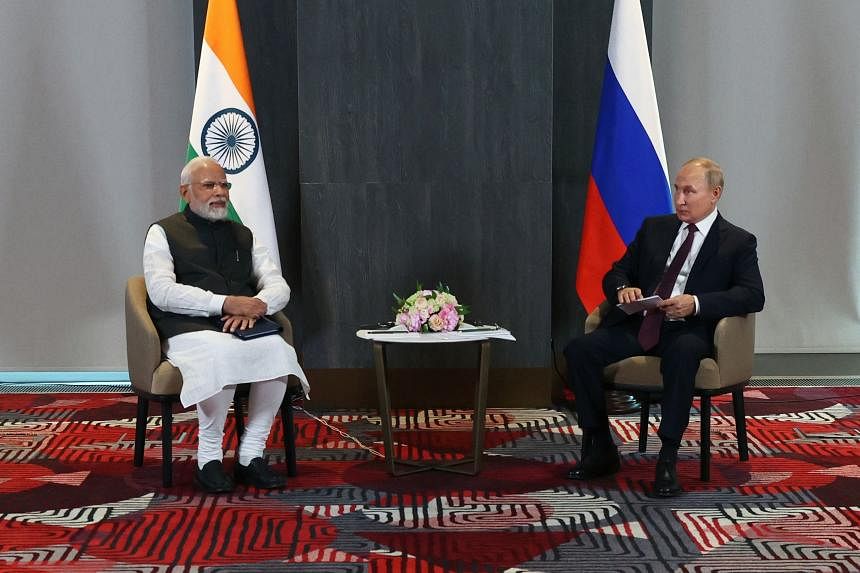NEW DELHI - Russian President Vladimir Putin told Indian Prime Minister Narendra Modi that he wanted the conflict in Ukraine to end as soon as possible, but maintained that Kyiv rejected negotiations and wanted a military solution.
Mr Modi, however, stressed the importance of democracy, diplomacy and dialogue, saying now is not the time for war.
The two leaders met on Friday in Samarkand, Uzbekistan, their first face-to-face meeting since Russia invaded Ukraine in February.
“I know about your position on the conflict in Ukraine and I know about your concern... We want all of this to end as soon as possible but the other party, the leadership of Ukraine... they refuse to engage in the negotiation process. They said they want to achieve their objectives... on the battlefield,” said Mr Putin.
His remarks on the sidelines of the Shanghai Cooperation Organisation (SCO) summit come at a time when Ukraine has claimed victory in recapturing territory from Russia.
Moscow calls the war in Ukraine a special military operation to protect its security interests. But Kyiv and its Western allies have dismissed this claim and have urged Russia to withdraw unconditionally.
Urging Mr Putin to find a peaceful resolution to the war, Mr Modi said: “I know today’s time is not a time for war.
“The biggest worry is food security, fuel security. We need to find a solution to this problem,” he added.
The Russian and Indian leaders have a long-time association dating back to 2001, when Mr Modi was the chief minister of the state of Gujarat. They have had four telephone conversations in the last nine months.
India has refused to take sides since the war started and has sought to balance close defence ties with Russia, a crucial defence partner, and New Delhi’s growing proximity to Washington.
Some 70 per cent of Indian weaponry is of Russian vintage.
New Delhi has also continued to buy discounted oil from Moscow to power its growing economy and avoid high fuel bills. The share of Russian oil in its import basket rose from 2 per cent to 13 per cent after the start of the war, according to the government. India has also increased fertiliser and coal imports from Russia.
According to the Russian government, trade turnover between the two sides reached US$11.5 billion (S$16.2 billion) in the first half of this year, up almost 120 per cent year-on-year.
Amid all this, the US, along with other Group of Seven countries, has started putting pressure on India to help enforce a price cap on Russian oil.
Analysts said the meeting between Mr Modi and Mr Putin was important for both sides.
“The significance is that Modi would definitely like to know Russia’s perspective of what is happening in Ukraine and some kind of a hint of possible timelines. We are walking a tightrope (in balancing ties with Russia and the West),” said Mr Nandan Unnikrishnan, a distinguished fellow at Observer Research Foundation, a New Delhi-based think-tank.
“From a Russian perspective, they want to show that they are not isolated. India is a large economy and a democracy.”
Russia is also looking to India for support as the South Asian country will hold a number of important positions in global organisations.
Russia’s Tass news agency quoted presidential aide Yuri Ushakov as saying that the discussion is particularly important “because India will preside over the UN Security Council in December, and in 2023, India will lead the SCO and will also chair the G-20 (grouping).”


